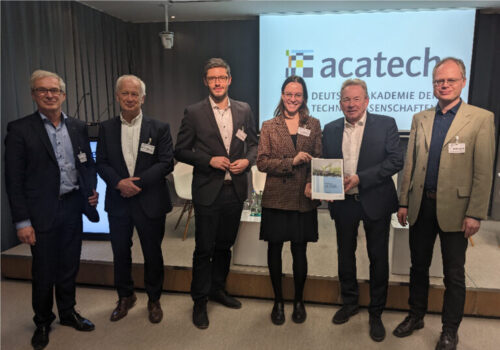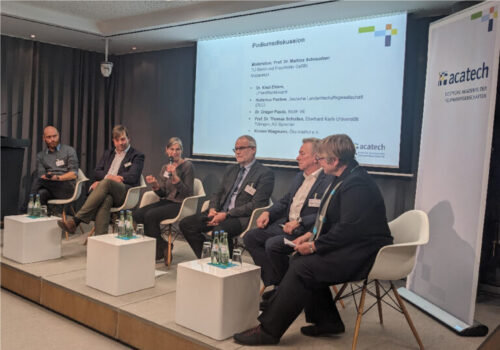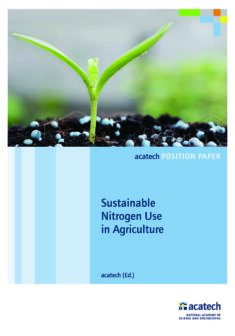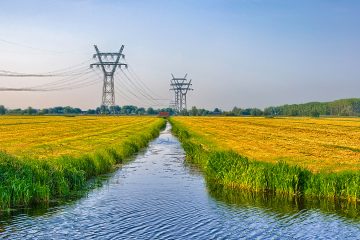Germany must urgently reduce its nitrogen surplus in agriculture – acatech POSITION PAPER outlines how

Berlin, 16 January 2023
Plants will not grow without nitrogen – but substantial emissions from agriculture are damaging entire ecosystems and are a major contributor to climate change in the form of nitrous oxide. Germany also exceeds the EU concentration limit for nitrates in groundwater. acatech National Academy of Science and Engineering outlines along the entire length of the value chain how the nitrogen surplus can effectively be reduced. The Academy’s recommendations include tighter limits, incentives for sustainable farming structures, more precise fertiliser application combined with pricing nitrogen surpluses and greater transparency for consumers.
Sustainable agriculture is one of the most important targets set by the UN Biodiversity Conference held in December 2022. The nitrogen surplus i.e. fertiliser applied in excess of what the plants need, is endangering ecosystems and biodiversity. For years Germany has exceeded the EU nitrates concentration limit for groundwater. The nitrogen surplus per hectare of agricultural land is 92 kilograms per annum. That amounts to around 1.5 million tonnes of nitrogen entering the atmosphere and water cycle in Germany. The environmental impact is disastrous – nitrogen-rich freshwater flowing into the North Sea and Baltic Sea has for many years been causing an inordinate degree of eutrophication and algal bloom. Nitrous oxide has 298 times the greenhouse effect in the atmosphere as carbon dioxide and therefore, in terms of volume, is a disproportionately greater factor in anthropogenic climate change. In addition, the nitrogen surplus impacts biodiversity. The cost to society of nitrogen entering the environment from agriculture is estimated to be 30 to 70 billion euros per annum.
The federal government has thus made nitrogen one of the targets of its sustainability strategy. It aims to reduce the nitrogen surplus per hectare of agricultural land to below 70 kilograms by 2030. According to acatech President Jan Wörner, “This target does not go far enough to tackle the most urgent problems facing the environment. Moreover, Germany will miss this rather unambitious target if the country does not change its course. We need a consistent strategy for effectively and permanently reducing nitrogen emissions with the concerted effort of agriculture, policymakers and scientists.”
Presentation and panel debate of the acatech POSITION PAPER
This is not the only measure the acatech experts under Project Manager Thomas Scholten (Eberhard Karls University of Tübingen) are calling for; it is time, they say, to pave the way for sustainable nitrogen management. To do that, many branches of agriculture must work together.
Expand organic farming, make conventional farming more sustainable
First and foremost, in the experts’ opinion, the nitrogen surplus, especially in conventional farming, must be reduced through sustainable farming structures in almost completely closed-loop systems. To achieve this, various approaches should be used in combination and developed with researchers. Thomas Scholten commented, “Farmers can choose species-rich rotational crops that include legumes and catch crops and, at the same time, reduce their use of mineral fertilisers in a targeted manner.” In addition, it is important, the experts say, to expand organic agriculture where no artificial chemical nitrogen fertilisers are used. “The yields in organic cereal farming are lower than in conventional farming. So the area of land required is greater in proportion to yield. One urgent task of research is to close the crop yield gap in organic farming.”
Reduce regional overconcentration of livestock farming
In some areas of Germany the concentration of livestock farming and resulting farmyard manure brings about a very high nitrogen surplus. Policymakers must put in place a framework for the reform of livestock farming so that animal welfare and a lower nitrogen surplus go hand in hand. Greater networking between livestock farmers and food crop producers would also contribute to this.
Introduce nitrogen pricing, tighten the fertiliser regulations
Policymakers must reward nitrogen reduction by putting in place the economic and legal framework. In the EU’s Common Agricultural Policy (CAP), area-based direct payments should be replaced with environmental and climate protection measures. Just as the carbon price creates an incentive to reduce emissions in the area of climate protection, nitrogen surpluses should be priced as well in order to reduce them. So as not to overburden the farms, the proceeds of nitrogen pricing should go back into agriculture, such as into supports for sustainable farming that reduces nitrogen. The German fertiliser regulations (Düngeverordnung – DüV) already requires farmyard manure to be applied close to the ground on arable land and, from 2025, on pasture too. But that’s not enough; it should be mandatory to apply farmyard manure close to the ground for uncultivated arable land as well.
Use precision farming and precision feeding
Modern agricultural and sensor technologies combined with data management systems, AI and modelling make it possible to take account of local conditions, even within a field, when spreading fertiliser. Thus, precision farming can be used to target the parts of the land where there is a sustainable rationale and benefit to fertilisation. Along similar lines, precision feeding facilitates foddering that caters to the animals’ needs and minimises nitrogen.
Eat less meat, throw away less food
Another important starting point is changing consumer and retailer behaviour. Thomas Scholten: “If we throw away less food, we have to produce less food, which in turn is easier on the environment. Change can be initiated at the industry level, for example, by revising the trading standards.” Furthermore, consumers should be encouraged to eat a healthy and environmentally friendly diet; for instance, to eat less meat and to be more mindful of sustainable production and origin. The national government could set a good example by revising government agencies’ procurement guidelines for food and catering so that more organic food and fewer animal products end up on the canteen menus. On this, Thomas Scholten said, “Such measures reflect back on all parts of the agricultural supply chain and thus directly contribute to the sustainable use of nitrogen in farming.”
According to the acatech POSITION, transparency in relation to the environmental footprint requires traceable and trustworthy labelling. A quality mark or label should, therefore, include nitrogen inputs and other important effects on the environment such as the carbon footprint and water consumption. This would require a database to be created and continuously developed. Government-mandated labelling would guarantee standardisation and consumer trust.






